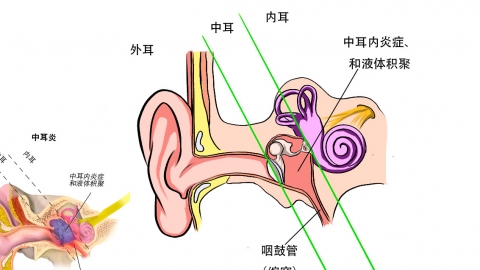How is otitis media treated?
Generally, otitis media may be caused by incorrect nose-blowing techniques, smoking, sinusitis, adenoid hypertrophy, mumps, and other factors. It is recommended to seek timely medical attention and follow a doctor's guidance for treatments such as general care and medication therapy. A detailed explanation is as follows:

1. Incorrect nose-blowing techniques
Using incorrect techniques to blow the nose, such as pinching both sides of the nose with fingers and forcefully expelling mucus, may push nasal discharge through the posterior nasal aperture toward the Eustachian tube, thus causing otitis media. It is recommended to use proper techniques, such as gently pressing one side of a nostril and expelling mucus through the other nostril, avoiding excessive force.
2. Smoking
Long-term smoking or exposure to secondhand smoke can repeatedly expose the nasal sinuses and throat to harmful substances in tobacco smoke, potentially leading to dysfunction of the Eustachian tube and resulting in otitis media. Smoking should be avoided altogether, and exposure to secondhand smoke minimized, while maintaining fresh indoor air.
3. Sinusitis
Sinusitis is often caused by upper respiratory tract infections, with bacteria, viruses, or fungi infecting the sinuses and causing inflammation of the sinus mucosa, resulting in large amounts of purulent secretions. These secretions may flow backward through the Eustachian tube into the middle ear, causing infection, while the spread of inflammation may also affect Eustachian tube function, leading to otitis media. Symptoms such as nasal congestion and headache may also occur. Treatment under a doctor's guidance may include medications such as amoxicillin-clavulanate potassium tablets, acetaminophen tablets, amoxicillin capsules, and others.
4. Adenoid hypertrophy
Adenoids may undergo pathological hyperplasia due to repeated inflammatory stimulation. Enlarged adenoids can compress the pharyngeal opening of the Eustachian tube, obstructing normal ventilation and drainage, causing negative pressure within the middle ear, leading to middle ear effusion and eventually otitis media. Symptoms such as snoring during sleep and nasal congestion may also occur. Treatment under medical guidance may include medications such as mometasone furoate nasal spray, montelukast sodium chewable tablets, ofloxacin ear drops, and others.
5. Mumps
Mumps is caused by mumps virus infection. The virus reaches the parotid gland through the bloodstream, causing parotid inflammation, and may also invade the middle ear through the Eustachian tube or bloodstream, causing otitis media. Symptoms such as parotid swelling and fever may also be present. Under a doctor's recommendation, treatment may include medications such as ribavirin granules, chloramphenicol ear drops, shuanghuanglian oral liquid, and others.
In daily life, attention should be paid to maintaining ear hygiene and avoiding water entering the ears; during seasonal changes and flu outbreaks, it is advisable to avoid crowded places as much as possible to reduce the risk of infection.





